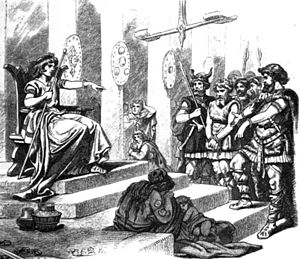From Wikipedia, the free encyclopedia
Forseti (Old Norse "the presiding one," actually "president" in modern Icelandic and Faroese) is an Æsir god of justice and reconciliation in Norse mythology. He is generally identified with Fosite, a god of the Frisians. Jacob Grimm noted that if, as Adam of Bremen states, Fosite's sacred island was Heligoland, that would make him an ideal candidate for a deity known to both Frisians and Scandinavians, but that it is surprising he is never mentioned by Saxo Grammaticus.[1]
Grimm took Forseti, "praeses", to be the older form of the name, first postulating an unattested Old High German equivalent *forasizo (cf. modern German Vorsitzender "one who presides").[2] but later preferring a derivation from fors, a "whirling stream" or "cataract", connected to the spring and the god's veneration by seagoing peoples.[3] It is plausible that Fosite is the older name and Forseti a folk etymology.[4] According to the German philologist Hans Kuhn the Germanic form Fosite is linguistically identical to Greek Poseidon, hence the original name must have been introduced before the Proto-Germanic sound change, probably via Greek sailors purchasing amber.[5] The Greek traveller Pytheas of Massalia, who describes the amber trade, is known to have visited the region around 325 BC.
Norse Forseti[edit]
According to Snorri Sturluson in the Prose Edda,[6] Forseti is the son of Baldr and Nanna. His home is Glitnir, its name, meaning "shining," refers to its silver ceiling and golden pillars, which radiated light that could be seen from a great distance. His is the best of courts; all those who come before him leave reconciled. This suggests skill in mediation and is in contrast to his fellow god Týr, who "is not called a reconciler of men."[7] However, as de Vries points out, the only basis for associating Forseti with justice seems to have been his name; there is no corroborating evidence in Norse mythology.[8] 'Puts to sleep all suits' or 'stills all strifes' may have been a late addition to the strophe Snorri cites, from which he derives the information.[9]
The first element in the name Forsetlund (Old Norse Forsetalundr), a farm in the parish of Onsøy ('Odin's island'), in eastern Norway, seems to be the genitive case of Forseti, offering evidence he was worshipped there.[9][10]
Frisian Fosite[edit]
According to Alcuin's Life of St. Willebrord, the saint visited an island between Frisia and Denmark that was sacred to Fosite and was called Fositesland after the god worshipped there. There was a sacred spring from which water had to be drawn in silence, it was so holy. Willebrord defiled the spring by baptizing people in it and killing a cow there.[9] Altfrid tells the same story of St. Liudger.[11] Adam of Bremen retells the story and adds that the island was Heiligland, i.e., Heligoland.[12]
There is also a late-medieval legend of the origins of written Frisian laws. Wishing to assemble written lawcodes for all his subject peoples, Charlemagne summoned twelve representatives of the Frisian people, the Āsegas ('law-speakers'), and demanded they recite their people's laws. When they could not do so after several days, he let them choose between death, slavery, or being set adrift in a rudderless boat. They chose the last and prayed for help, whereupon a thirteenth man appeared, with a golden axe on his shoulder. He steered the boat to land with the axe, then threw it ashore; a spring appeared where it landed. He taught them laws and then disappeared.[13][14][15] The stranger and the spring have traditionally been identified with Fosite and the sacred spring of Fositesland.
Modern scholarship, however, is extremely critical about this hypotheses, as the attribute of the axe is normally associated with Thor, not with Forseti.[16]
In popular culture[edit]
Forseti appears in the Dungeons & Dragons role-playing game's pantheon, and is often chosen as a patron god by paladins.





No comments:
Post a Comment